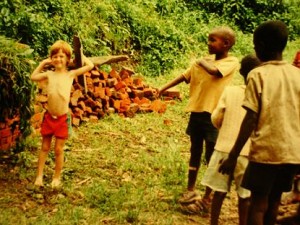
Carl Wilkens' son, Shaun with Rwandan children, in the days before the 1994 genocide.
How do we come together as a community in stressful times?
What is our response to violence – in a variety of forms – from bullying; domestic issues; crime….. to genocide?
The Orcas Island Prevention Partnership (OIPPP) coalition, with sponsorship assistance from the Orcas Christian School, bring Carl Wilkens to speak to the Community Forum this Sunday to address these questions.
OIPP Director Marta Nielson says, “The evening will highlight what we as global citizens have in common and how our commonalities are so much greater than our differences.
“In a break from his 46,000 mile, 9 month bicycle journey around the nation, [Carl Wilkens] is actively spreading the message to teens and community members that ‘One person can make a world of difference.’”
Carl Wilkens is the former head of the Adventist Development and Relief Agency International in Rwanda. In 1994, he was the only American who chose to remain in the country after the genocide began. His choice to stay and try to help resulted in preventing the massacre of hundreds of children over the course of the genocide.
Nicholas Kristof, “New York Times” columnist wrote of Wilkens:
Wilkens, a Seventh-day Adventist missionary, was living with his wife and three small children in Kigali, Rwanda, in 1994. Then a Hutu militia began to slaughter the Tutsi, beginning with prominent figures like his banker neighbors, who threw their two youngest children to safety over a back fence before they were executed. Mr. Wilkens and his wife, Teresa, tried to distract their children from the carnage by playing a variation of musical chairs in which you could move only when there was no gunfire nearby.
U.S. officials and church leaders ordered Mr. Wilkens to join an emergency evacuation of foreigners from Rwanda, and relatives and friends implored him to go.
He refused.
Ms. Wilkens and the children left, but Mr. Wilkens insisted on staying in Kigali to try to protect Tutsi friends. His father warned him that even if he survived, his insubordination might end his career in the church. In the end, every other American left Kigali, but Mr. Wilkens remained through the entire genocide.
”It just seemed the right thing to do,” he recalled … ”I could take my blue passport and go, and moments later my housegirl and night watchman, both identifiable Tutsis, were going to be butchered.”
One evening the militia came to kill Mr. Wilkens and his Tutsi servants, but Hutu neighbors praised his humanitarian work and the militia went away. Death threats piled up, but Mr. Wilkens spent his days talking his way through roadblocks of snarling, drunken soldiers so he could take water and food to orphanages around town. … This continued for three months as 800,000 people were slaughtered. During all this time, President Bill Clinton and other Americans dithered, and there was an utter moral failure around the world.
But Mr. Wilkens plodded on each day…. Survivors describe him as extraordinarily courageous, not only for staying in Rwanda but also for venturing out each day into streets crackling with mortars and gunfire and pushing his way through roadblocks of angry, bloodstained soldiers armed with machetes and assault rifles.
Of course, Mr. Wilkens managed to save only a tiny number of Tutsi in Kigali, and Americans sometimes ask if his work wasn’t like spitting into the ocean. That’s true, he acknowledged, adding, ”But for the people you help, it’s pretty significant.”
Wilkens’ has been brought to Orcas to speak at the Community Forum to be held on Sunday, Jan. 17 from 5 to 7:30 p.m. at Orcas Center. “The Orcas Island Prevention Partnership is a community coalition helping to create a safe and healthy community.” The entire community is welcome to attend.
Wilkens will also speak at 11 a.m. on Friday, Jan. 15 to Orcas Island High School Students at the High School Commons.
To see Wilkens’ work, go to worldoutsidemyshoes
For more information on Wilkens’ efforts to save lives in Rwanda, go to humanrightsblog
**If you are reading theOrcasonian for free, thank your fellow islanders. If you would like to support theOrcasonian CLICK HERE to set your modestly-priced, voluntary subscription. Otherwise, no worries; we’re happy to share with you.**







